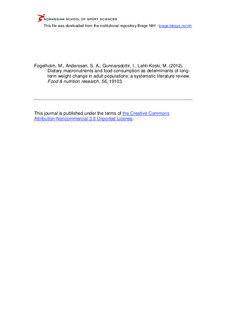Dietary macronutrients and food consumption as determinants of long-term weight change in adult populations: a systematic literature review
Journal article, Peer reviewed
Permanent lenke
http://hdl.handle.net/11250/171058Utgivelsesdato
2012-08-13Metadata
Vis full innførselSamlinger
- Artikler / Articles [2120]
Originalversjon
Food & Nutrition Research. 2012, 56, 19103Sammendrag
This systematic literature review examined the role of dietary macronutrient composition, food consumption
and dietary patterns in predicting weight or waist circumference (WC) change, with and without prior weight
reduction. The literature search covered year 2000 and onwards. Prospective cohort studies, casecontrol
studies and interventions were included. The studies had adult (1870 y), mostly Caucasian participants. Out
of a total of 1,517 abstracts, 119 full papers were identified as potentially relevant. After a careful scrutiny, 50
papers were quality graded as A (highest), B or C. Forty-three papers with grading A or B were included in
evidence grading, which was done separately for all exposure-outcome combinations. The grade of evidence
was classified as convincing, probable, suggestive or no conclusion. We found probable evidence for high
intake of dietary fibre and nuts predicting less weight gain, and for high intake of meat in predicting more
weight gain. Suggestive evidence was found for a protective role against increasing weight from whole grains,
cereal fibre, high-fat dairy products and high scores in an index describing a prudent dietary pattern.
Likewise, there was suggestive evidence for both fibre and fruit intake in protection against larger increases in
WC. Also suggestive evidence was found for high intake of refined grains, and sweets and desserts in
predicting more weight gain, and for refined (white) bread and high energy density in predicting larger
increases in WC. The results suggested that the proportion of macronutrients in the diet was not important in
predicting changes in weight or WC. In contrast, plenty of fibre-rich foods and dairy products, and less
refined grains, meat and sugar-rich foods and drinks were associated with less weight gain in prospective
cohort studies. The results on the role of dietary macronutrient composition in prevention of weight regain
(after prior weight loss) were inconclusive.
Beskrivelse
This journal is published under the terms of the Creative Commons Attribution-Noncommercial 3.0 Unported License.
